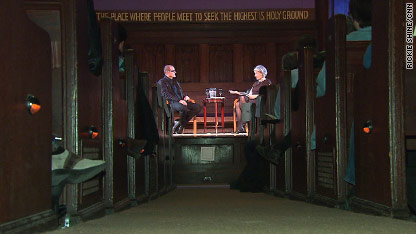The Offense of the Gospel in Alabama
Alabama Governor Robert Bentley made controversial remarks that some people are not happy about. On Martin Luther King Day (1/17/11), the governor made a speech at the Dexter Avenue King Memorial Baptist church shortly after he was sworn into office. Two days later, Bentley’s director of communications released a statement on his behalf - “The governor had intended no offense by his remarks. He is the governor of all the people...”
The contents of Bentley’s speech have Bill Nigut, the Southeast regional director of the Anti-Defamation League, stating that Bentley should not only apologize but also release a full retraction of his declaration. According to Nigut, there is no excuse for making the kind of mistake that Bentley is charged with making - “The governor does not have to be a seasoned politician to understand the impact of remarks like that,” Nigut, said. “Joey Kennedy of The Birmingham News also adds “He is not a civilian anymore; he is not a private person anymore. He is the governor of Alabama every day, 24-hours a day.”
With such a reaction from Governor Bentley’s speech, what could he have possibly said that was so offensive? Governor Bentley under an official capacity said that Alabamians should ''love and care for each other." He said that he was color blind but if they did not have the same daddy as he did, then they were not his brothers and sisters; ''But if you have been adopted in God's family like I have, and like you have if you're a Christian and if you're saved, and the Holy Spirit lives within you just like the Holy Spirit lives within me, then you know what that makes? It makes you and me brothers. And it makes you and me brother and sister."
To differentiate one American from another American on the sole basis of being a believer in Jesus Christ is an offense. In the economy of the world, all beliefs are equal and to declare one as to being superior to the other is to illustrate a lack in civility, it is to show one’s ignorance and presumption, it is to rob the god of diversity his homage that he demands as a blood sacrifice from a world that is all too eager to feed him. In the economy of the world, it is unimaginable to suggest that one may find favor with God while another is lost and blind without Jesus Christ. Nigut expresses his offense; “These are remarks of a man who truly believes what he said, apparently. This seems to be quite clear that Christians are part of an exclusive relationship he has with his brothers and sisters and the rest of us are not.” Nigut would have, however, preferred Governor Bentley to say something more along the lines of; “I realize I was wrong that we are all brothers and sister, and not single out only the ones who believe in Jesus Christ,”
Is it reasonable to believe that Nigut has a point? Even after taking First Amendment rights into consideration, is it possible that Bentley is in the wrong? According to Gene Policinski, the executive director of The First Amendment Center, Bentley is a public official and like all public officials, his office “represents all faiths.” Policinski adds, “Religion is a part of many peoples’ lives, but there is an implication when a particular faith receives favorable or disfavorable treatment. It is a very difficult line to draw, but it is one any politician has to be aware of.”
Polincinski is right, all politicians need to be aware of favoring one group of people over another group of people. Kennedy is also right; Governor Bentley is the governor of Alabama 24 hours a day, seven days a week. Nigut is also right, it appears that Governor Bentley believes the statements he made during his speech. Bentley’s critics have concerns but are they valid concerns? Did Bentley say he was going to favor one group over another? Did Bentley say that he wasn’t governor 24 hours a day so that he can act differently when he’s not in the office? Does Bentley’s beliefs force him to treat Christians and non-Christians with different measures of justice? Does Bentley’s beliefs force him to discriminate and disenfranchise one group of people over another group of people?
In none of Bentley’s remarks that have been reported as being offensive in
the piece that is referenced in this post did Bentley say that he was going to do anything illegal. In none of Bentley’s remarks did he say that he was going to disenfranchise one group of people over another or that he was going to use his office to promote one faith over another. It is a secularized belief that promotes using a political office to represent a faith. It is Policinski that said that Bentley’s office “represents all faiths” when in reality it is unique doctrine that differentiates one faith from another and therefore represents said faith. I wouldn’t call Frankfort, for example, and ask my governor, senator or congressman about infant baptism. It is not the government’s job to represent any faith but to preserve men’s rights so that they can practice their faith on their own accord. Jesus said that
His kingdom is not of this world as well as,
"If the world hates you, keep in mind that it hated me first.”. It was never commanded of us to adopt the world into God’s family. This world is going to burn up and it is men’s lost souls that we fight for, not anything of this world. Christ doesn’t want our governments; He wants to save the lost so that God may be glorified.
It is only through a lack of understanding of Christian teaching that one could even presume that Bentley’s remarks were any sort of indication that he intended to favor one group of people over another. It is true that God differentiates Christians from non-Christians and one day He will
separate the sheep from the goats but at the same time, however, it is God’s children (Christians) that are given the
Great Commission – to share the Gospel of Christ so that
salvation may be obtained and lost men may be saved. If we follow the greatest commandments given to us, we are instructed to
love our neighbor as ourselves and later we find out that it is the
one that shows mercy to another that is the one that is acting like a neighbor. With any real sincerity when examining Christian teaching and doctrine, one reasonably has to conclude that if one were to follow Christian beliefs while he/she governs a state that others from other faiths would not be in any kind of danger. We are never commanded to harm others even when we find it necessary to rebuke false teachings and teachers.
Render to Caesar that is Caesar’s is the rule of law that Governor Bentley needs to take heed of; meaning that he needs to act appropriately within his office of governor while at the same time giving all allegiance, faith and confidence to God. By remaining true to Christian teaching, there is no conflict of interest – Bentley can be loyal to the gubernatorial office as well as to the convictions of His beliefs. We should pray for Governor Bentley to make an example of his office by exuding a blameless execution of his faith unto God in praise of Jesus Christ all the while he governs the state of Alabama with authority without any guilt of wrong doing. Meanwhile, perhaps we can make our own contribution to the testimony of the Christian faith by living exemplary lives. Contrary to the beliefs of Bentley's critics, we should not live one life while we are in office and live another life when we are off the clock as if our faith was an accessory in our lives that we can put on and take off the same as an expensive watch. It is the false converts that pretend to be sheep on Sunday all the while they are living like goats throughout the rest of the week. Bear the fruit of the vine by remaining to be in Him that gives life.
In the love of our Heavenly Father,
W.






